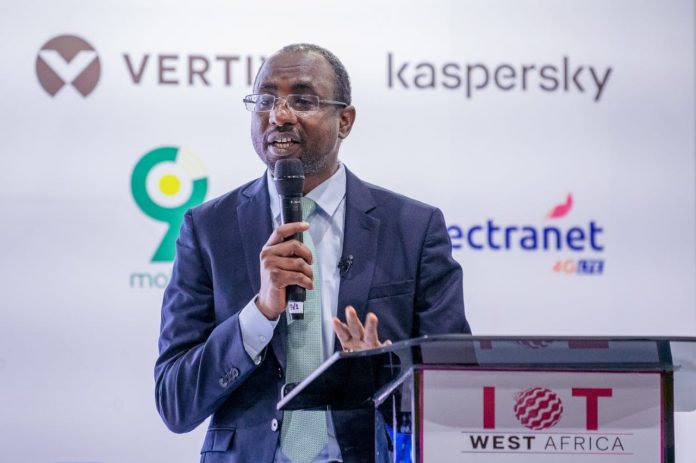In a bid to implement the Digital Transformation pillar of Strategic Road Map and Action Plan (SRAP 2021-2024) of the National Information Technology Development Agency (NITDA), Kashifu Inuwa, CCIE, the Agency’s Director General, has emphasised the need for collaboration to unlock Nigeria’s potential in the realm of Internet of Things (IoT) and it’s revolutionary impact on the country’s digital ecosystem.
Inuwa made this plea while delivering his keynote address at the IoT West Africa Conference and Exhibition 2023 in Lagos State.
The DG noted some challenges that need unlocking in order to access the potentials of IoT, especially infrastructure, cyber security, and data protection, stating that most IoT use cloud-based solutions — Alexa, Google, and others.
Inuwa said today’s computer systems are outperforming humans in many endeavours, especially the rise of generative AI, chat GPT, etc, and that is the fabric of the shift humanity is witnessing in accelerating the convergence between physical, biological, and digital world.
Referring to a McKinsey report, Inuwa said that by 2030, IoT has the capacity to generate between 5.5 to 12.6 trillion US dollars in value across different industries. Citing the exponential growth of connected devices, he pointed out that the number of connected devices now exceeds the global population, as reported by Cisco.
“Looking at the areas you can apply them, such as the area of agriculture, we need to increase our agri-products, and IoT can help us to do that with lesser human efforts,” he said.
He explained further that there are wearable plant sensors at the moment, which is one of the top technologies in 2023.
The NITDA boss hinted that farmers can have a sensor attached to their plant to manage its health, watering, fertilizer, pesticides, and this would invariably enhance the increase of food produce.
He said, “According to World Economic Forum, there is need to increase the global food production by 70% in the next seven years to address food security”.
Inuwa then opined that Nigeria, with its population growth rate, need to do more than any other country, “because we are growing faster than any country in the world.”.
He asserted that by 2050, Nigeria will be the third largest population in the world, therefore, there is need to explore how we can use IoT to increase the country’s food production.
He said IoT can be used to automate farms in the area of precision agriculture, soil moisture, watering, and many other functions within the farm.
In addition to agriculture, the NITDA Director General discussed the role of IoT in addressing security challenges, as IoT devices can monitor activities, movement patterns, and even enable geofencing to prevent incidents such as farmer-herder conflicts and kidnapping.
The DG emphasised that IoT could be utilised to enhance oil theft prevention by monitoring pipelines and sending alerts for quick security response.
He added that, “Today, most wearable IoT devices monitor the heartbeats, blood pressure which is also useful to medical practitioners in providing information for telemedicine and helps people with disabilities or the senior citizens as first point of health consultancy,” he said.
“We don’t have locally manufactured IoT devices, we need to build infrastructure, like data centers, cloud solution where we can put our IoT data,” he urged.
Inuwa advised that there is also the need to develop the talent within the country to enable digital sovereignty for the nation to gain independence of digital offerings.
“We need to build a tailor-made solution that will address our challenges, harness indigenous talents to promote IoT solutions, and this requires the collective efforts of the government, private sectors and all stakeholders.”
“We need you, the ecosystem, to do it because our approach today is no more government sitting in the office using armchair theory to come up with policies or regulations, we work with you, the ecosystem, to co-create whatever we do,” he concluded.
NITDA Nigeria




